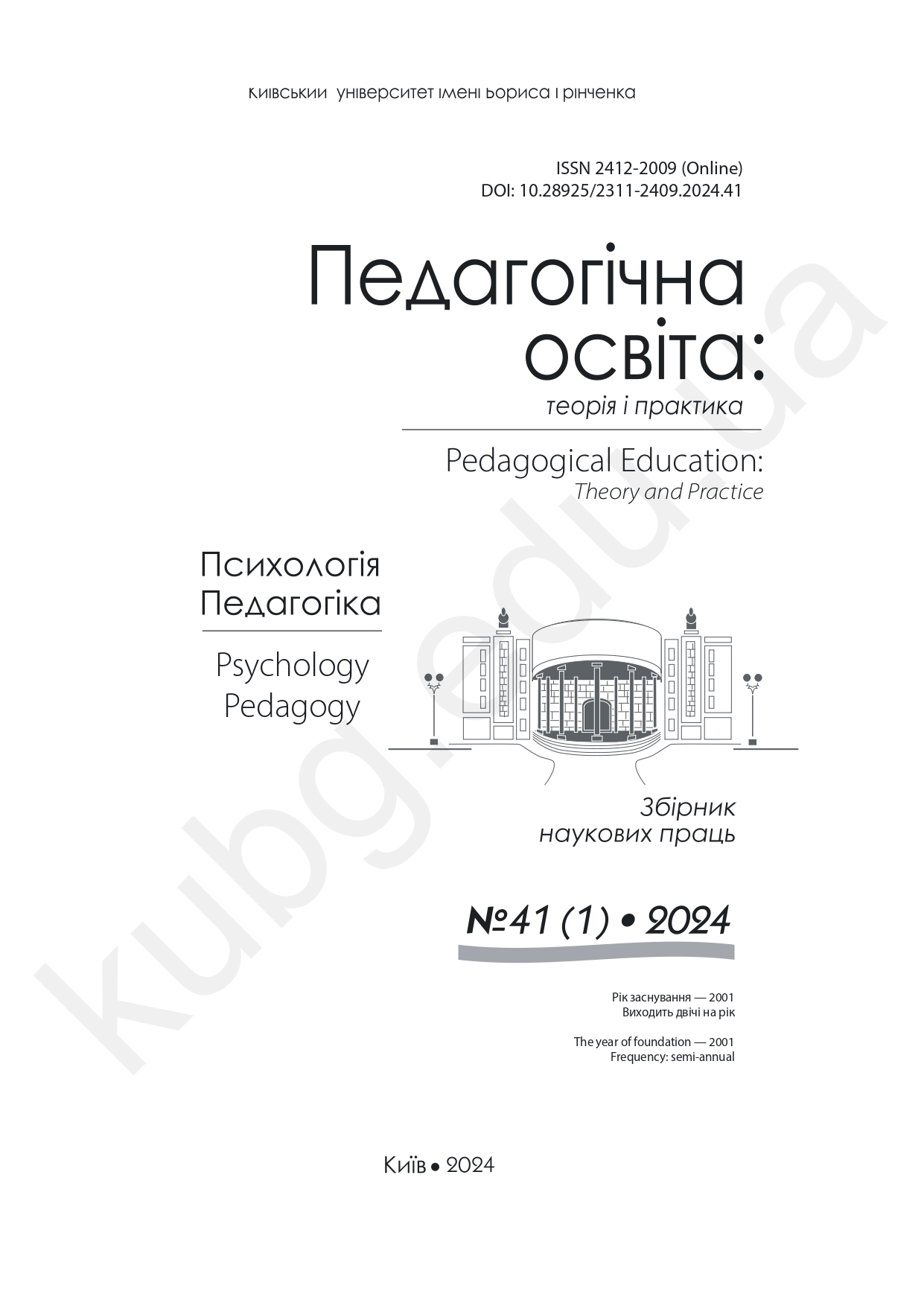Modern high school handbook: analysis of sexism and gender stereotype
DOI:
https://doi.org/10.28925/2311-2409.2024.414Abstract
The article is focusing on one of the most important problems of gender studies — the creation
of modern methodological and curricular support for the educational process in higher education.
The author analyses the experience of teaching the elective course ‘Gender Studies’ for Bachelor’s
students majoring in Primary Education at the Faculty of Pedagogical Education of Borys Grinchenko Kyiv
Metropolitan University. This course is practice-based and aims to prepare pre-service teachers to address
gender issues in the educational process. Teaching this course raised questions about the content of higher
education textbooks and their analysis concerning sexism and gender stereotypes. The author recognizes
that textbooks on gender issues are currently linked to certain courses: gender psychology, gender sociology,
gender pedagogy, gender journalism, etc. However, according to the author, a modern textbook should
be comprehensive and based on the latest scientific research, deep interdisciplinary connections, and
contemporary practice. The article defines the main characteristics of a modern textbook in general and
gender studies, in particular: it should be comprehensive in terms of analysis when it comes to sexism and
gender stereotypes, regardless of the specialty; the content of any textbook should be based on scholarly
research in the field of gender studies; the textbook should show deep interdisciplinary connections;
the formation of critical thinking of students is the main goal of any modern textbook, regardless of the
specialty it is written for; without the use of interactive teaching methods, it is impossible to create a modern
textbook. The article also discusses approaches and methods for analyzing textbooks for sexism and gender
stereotypes. The author pays special attention to hidden discrimination in the curricula on gender equality of students and schoolchildren
Downloads
References
Datsiuk T., Hihin O., Tymoshenko L. (2023). Pravove rehuliuvannia hendernoi rivnosti v umovakh voiennoho stanu [Legal regulation of gender equality under martial law]. Ekonomika. Finansy. Pravo. [Economics. Finance. Law] 2023. № 7. P. 78–81. DOI: https://DOI.org/10.37634/efp.2023.7.16).
Kenworthy L., Malami M. (1999). Gender Inequality in Political Representation: A Worldwide Comparative Analysis. Social Forces. 1999. Vol. 78 (1). Р. 235–268. https://doi.org/10.1093/sf/78.1.235
Henderni studii u vyshchii shkoli [Gender Studies in Higher Education] (2022): suchasni vyklyky ta dosiahnennia [current challenges and achievements]: materialy Vseukrainskoho naukovo-pedahohichnoho pidvyshchennia kvalifikatsii [materials of the Ukrainian research and pedagogical advanced training], Lviv, 5 September – 16 October 2022 р. Odesa: Helvetyka, 2022. 120 p.)
Council of Europe Gender Equality Strategy for 2018–2023. Council of Europe. 2018. URL: https://rm.coe.int/prems-041318-gbr-gender-equality-strategy-2023-ukrnew2/16808b35a4 (accessed: 01.03.2024).
Hender dlia medii [Gender for the media] (2017): pidruchnyk iz hendernoi teorii dlia zhurnalistyky ta inshykh sotsiohumanitarnykh spetsialnostei [a textbook on gender theory for journalism and other social sciences and humanities]/ ed. M. Maierchyk, O. Plakhotnik, H. Yarmanova. Kyiv : Krytyka, 2017. 220 p.
Haidenko V. (2019) Henderna pedahohika [Gender pedagogy]. Manual / V. Haidenko, A. Predborskaia – Kyiv: Universytetska knyha, 2019. – 313 p.
Henderson E. (2015). Gender pedagogy/Teaching, Learning and Tracing Gender in Higher Education. – Basingstoke: Palgrave Macmillan, 2015. p.38.
DOI:10.1057/9781137428493.0007.
Genderni mediini praktyky [Gendered media practices] (2014): Navchalnyi posibnyk iz gendernoi rivnosti ta nedyskryminatsii dlia studentiv vyshchykh navchalnykh zakladiv [Textbook on gender equality and non-discrimination for students of higher educational institutions] /Ed. S. Shturkhetskyi. – Kyiv, 2014. – 206 p.
Zhinky ta choloviky [Women and men]/ Demohrafichna ta sotsialna statystyka [Demographic and social statistics] / Osvita [Education]. Derzhavna sluzhba statystyky Ukrainy [State Statistics Service of Ukraine]. 2022. URL: https://www.ukrstat.gov.ua/ (accessed: 01.03.2024).
Kyivskyi stolychnyi universytet imeni Borysa Hrinchenka [Borys Grinchenko Kyiv Metropolitan University]. Ofitsiinyi veb-sait [Official website]. URL: https://kubg.edu.ua/ (accessed: 01.03.2024).
Reiestr subiektiv osvitnoi diialnosti [Register of subjects of educational activity]. URL: https://registry.edbo.gov.ua/ (accessed: 01.03.2024).
Malakhova O. A., Marushchenko O. A., Drozhzhyna T. V., Korobkina T. V. (2016) Teoretyko-metodolohichni zasady hendernoi ekspertyzy pidruchnykiv. Ekspertyza shkilnykh pidruchnykiv: posib. [Theoretical and methodological foundations of gender expertise of textbooks. Expertise of school textbooks: a textbook.]/ Eds. O. M. Topuzov, N. B. Viatkina. Kyiv: Pedahohichna dumka, 2016. P. 48-56. URL: http://repo.knmu.edu.ua/handle/123456789/13256).
Strilnyk O. (2019) Osvita yak fabryka smysliv: vid statevo-rolovoho pidkhodu do henderno chutlyvoi pedahohiky [Education as a factory of meanings: from sex-role approach to gender-sensitive pedagogy]. 02.12.2019. https://genderindetail.org.ua/season-topic/gender-after-euromaidan/osvita-yak-fabrika-smisliv-vid-statevo-rolovogo-pidhodu-do-genderno-chutlivih-zmin-1341286.html

